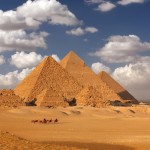The Arab World and Revolution 2.0
, Posted in: Inspiration, Author: nleavitt (February 27, 2011)
 One of the sparks of the Egyptian revolution, Google marketing manager Wael Ghonim, has exemplified how social media has played a pivotal role in the ongoing protests against despotic rule in North Africa and the Middle East.
One of the sparks of the Egyptian revolution, Google marketing manager Wael Ghonim, has exemplified how social media has played a pivotal role in the ongoing protests against despotic rule in North Africa and the Middle East.
As you’re probably aware by now, Ghonim’s Facebook page helped gather momentum in fomenting popular dissent against former President Hosni Mubarak. Ghonim called it ‘Revolution 2.0.’
In reviewing numerous articles, blogs, and listening/watching radio and TV reports, a few really struck home. Evgeny Morozov, a visiting scholar at Stanford University, succinctly summed it up in the Wall Street Journal.
Morozov said that while it’s important to acknowledge the role that the Internet played in Egypt, don’t forget that the protesters “were blessed with a government that didn’t know a tweet from a poke – as illustrated, most of all, perhaps, by its desperate (and belated) gambit in temporarily shutting off the county’s access to the outside world.”
But Morozov also added a caveat, stating that while it was Mubarak’s ignorance of the Internet that helped bring him down, other regional dictators are already playing catch up and quickly reviewing the playbook on how to effectively roll out online propaganda.
In Bahrain, for instance, Twitter was inundated with government propaganda in a clumsy attempt to make it a less credible information source about the protests. Sudan’s President Oman Al-Bashir (who is the first sitting head of state indicted by the International Criminal Court in the Hague on counts of war crimes and crimes against humanity for allegedly orchestrating a campaign of murder, torture, rape and forced expulsions in Darfur) plans to provide more electricity countrywide so his supporters can wax eloquent for him on Facebook.
Seemingly overnight, social media has become an influential trigger of these regional revolts. Beyza Unal, a doctoral student at Old Dominion University, recently wrote that “today’s social media supports an explicit ideology that backs up openness and transparency in state formalization, facilitating a higher standing – a political discourse on its own that can change the course of events.”
Jeff Jarvis pens Buzzmachine.com, which focuses on media and news. He’s an associate professor and director of the interactive journalism program at the City University of New York’s Graduate School of Journalism.
Jarvis recently blogged that Facebook, Twitter and YouTube are fast becoming the Gutenberg press of the Middle East because they provide similar tools that empower people to speak, share and gather.
“The revolutionaries of the Middle East use-indeed, depend upon- these social tools and the net. That is the reason why we must protect them, for by doing so we protect the public and its freedoms…when Mubarak shuts down the Internet, they violate the human rights of their citizens as much as if they burned the products of Gutenberg’s press.”
How these transformative protests will eventually play out is still unknown. But the power of the online connection demonstrates that Revolution 2.0 has opened up a Pandora’s Box of freedom of expression throughout much of the Arab world that will hopefully take root and flourish.
Comments